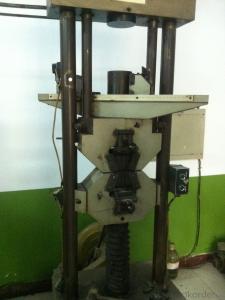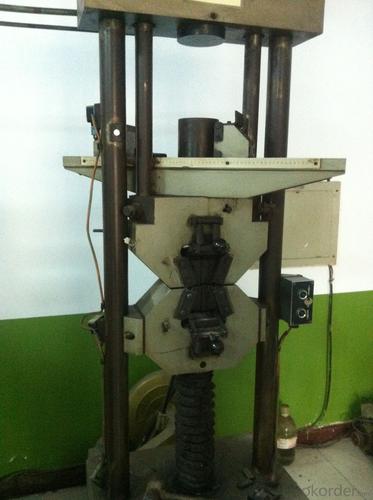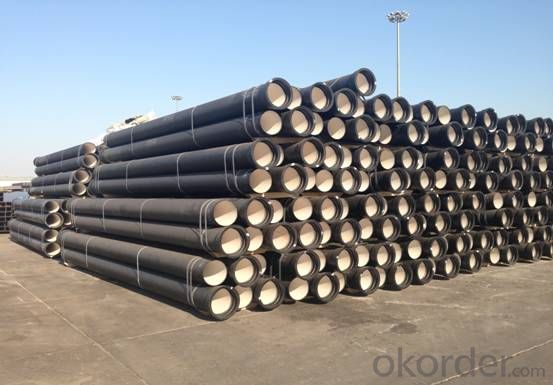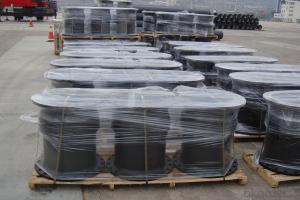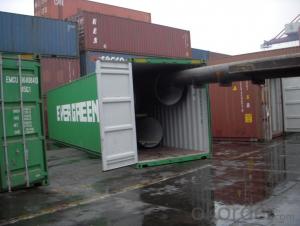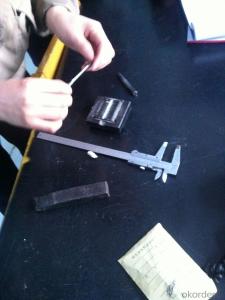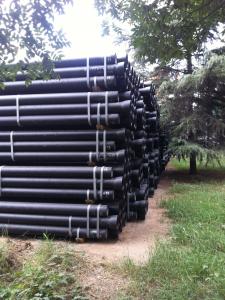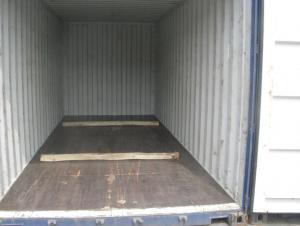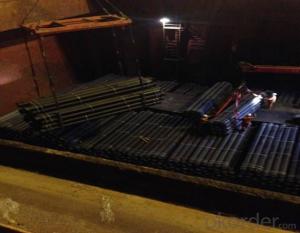DUCTILE IRON PIPE AND PIPE FITTINGS K8 CLASS DN150
- Loading Port:
- Tianjin
- Payment Terms:
- TT OR LC
- Min Order Qty:
- 23 pc
- Supply Capability:
- 3000 pc/month
OKorder Service Pledge
OKorder Financial Service
You Might Also Like
Material : Ductile Cast Iron
Size Range : DN 80mm to DN 2000mm
Unit Effective Length : 6m or 5.7m
Manufacture Standard: ISO 2531:1998/ EN 545:2006/EN 598:2007
Annual capacity : 200,000 tons
Coating Exterior: Zinc 130g/m2 according to ISO 8179-1 and bitumen coating 70 microns.
Cement Interior: Portland Cement/ High Alumina Cement/ Sulphate Resisting Cement Lining according to ISO 4179
Special requirements on external coating and internal lining can be applied
We also provide accessories such as SBR/EPDM rubber gaskets, lubricant paste, pipe caps, PE sleeves, etc.
Additional Parts:
Each pipe is strictly inspected according to related standard to ensure permanently high performance.
Easy Installation at site and service free for life
Long Service Lifespan
Quotation will arrive you within 24hours once we get your inquiry.
We guarantee offering you a competitive price.
A copy of original inspection reports of pipes will be offered after shipment.
Photos of loading process will be sent to the customer after shipment effect.
We will follow-up the delivery progress after shipment effect and update to the customer on weekly basis.
- Q: Are ductile iron pipes suitable for installation in areas with high seismic activity?
- Areas with high seismic activity are well-suited for the installation of ductile iron pipes. Their ability to withstand external loads and ground movement is a key advantage, making them ideal for seismic zones. In fact, these pipes possess excellent flexibility and high tensile strength, enabling them to endure ground shifting and seismic forces without breaking or fracturing. Additionally, their high resistance to impact and stress decreases their vulnerability to damage during seismic events. Furthermore, the performance of ductile iron pipes in seismic areas has been extensively demonstrated. They have been successfully implemented and utilized in earthquake-prone regions worldwide for numerous years, showcasing their capacity to endure ground movements caused by seismic activity without jeopardizing their structural integrity. Moreover, ductile iron pipes offer the added benefit of being highly durable and long-lasting, which is vital in high seismic areas where infrastructure must withstand frequent ground movements. Their extended lifespan reduces the necessity for frequent maintenance and replacement, resulting in a cost-effective option in the long term. However, it is crucial to note that proper installation techniques and adherence to seismic design guidelines are imperative to ensure optimal performance of ductile iron pipes in high seismic areas. Consulting experienced engineers and adhering to local building codes and regulations is recommended to guarantee correct installation and the ability to withstand the specific seismic conditions of the area. Overall, due to their flexibility, strength, durability, and proven performance, ductile iron pipes are regarded as a suitable choice for installation in areas with high seismic activity.
- Q: Are ductile iron pipes resistant to alkali attacks?
- Ductile cast iron, commonly used in ductile iron pipes, has demonstrated its remarkable resistance to alkali attacks. This is achieved through the inclusion of specific chemical compositions that provide exceptional corrosion resistance. Alkali attacks, which arise from the interaction between alkaline substances and metals or other materials, are effectively countered by the dense and protective oxide film present on both the inner and outer surfaces of ductile iron pipes. This oxide film forms naturally over time and possesses a composition and structure that offer excellent resistance to alkali attacks. Moreover, to further enhance their ability to withstand corrosion and chemical reactions, ductile iron pipes are frequently coated with various protective layers, such as epoxy or zinc. It should be emphasized that although ductile iron pipes exhibit a high resistance to alkali attacks, the severity and concentration of the alkali substances can still impact their overall performance. In extreme instances, where there are exceedingly high concentrations of alkali substances or prolonged exposure to aggressive alkaline environments, some damage may occur to the protective layers of the pipes. Nonetheless, within normal conditions and acceptable parameters, ductile iron pipes are widely regarded as possessing outstanding resistance to alkali attacks.
- Q: Are ductile iron pipes resistant to UV degradation?
- No, ductile iron pipes are not resistant to UV degradation.
- Q: The difference between HDPE pipe and ductile iron pipe
- Different installation methods, ductile iron pipes are common flexible sealing ring, slide into the connection; the main drainage pipe is W and B type, clamp connection and mechanical connection, the inner gasket ring.
- Q: Can ductile iron pipe be used for gas distribution systems?
- Indeed, gas distribution systems can utilize ductile iron pipe. Ductile iron, being a robust and enduring substance, exhibits resistance to corrosion, thus rendering it suitable for subterranean applications. Its capacity to endure high pressure and furnish a dependable and enduring solution has led to its widespread employment in gas distribution systems for numerous years. Moreover, ductile iron pipes are acknowledged for their pliability, facilitating simpler installation and upkeep. Nevertheless, it is imperative to guarantee conformity with the specific requirements and standards of gas distribution systems when implementing ductile iron pipes to ensure the system's safety and efficiency.
- Q: How much is a ductile iron pipe dn400?
- High quality cast iron ductile iron pipe with low phosphorus and low sulfur iron making production of blast furnace, according to the current international advanced centrifugal casting, annealing process, water-cooled metal type centrifugal pipe casting machine casting, after annealing, socket dressing, pressure test, internal lining layer of cement, cement treated lining, water and health cement lining, outer wall coated with asphalt paint, asphalt paint baking, socket antirust processing, spray marks and other procedures for the packaging, with high strength, high elongation, corrosion resistance of a body strong as iron.
- Q: What is the expected internal lining material for ductile iron pipes?
- The expected internal lining material for ductile iron pipes is typically cement mortar lining or polyethylene lining. Cement mortar lining provides a protective coating to the interior surface of the ductile iron pipe, preventing corrosion and extending its lifespan. On the other hand, polyethylene lining is a thermoplastic material that offers resistance to corrosion, abrasion, and chemicals, making it suitable for applications where aggressive substances are present or when the water quality is poor. Both lining materials have their advantages and are commonly used in the industry, depending on the specific requirements and conditions of the project.
- Q: How are ductile iron pipes different from other types of pipes?
- DI pipes, also called ductile iron pipes, possess unique properties and are manufactured differently from other pipe types. They are specifically designed to withstand high-pressure systems and offer exceptional strength and durability, setting them apart from PVC, steel, or concrete pipes. One significant distinction lies in the material used. DI pipes are made from a type of cast iron containing additional elements like carbon and silicon, which give them remarkable strength and flexibility. This composition enables DI pipes to handle high-pressure systems, making them suitable for applications requiring reliable water supply, such as water mains, sewer systems, and industrial pipelines. Another distinguishing feature of DI pipes is their ability to endure external loads and pressure. They possess high tensile strength, enabling them to bear heavy loads without cracking or breaking. This property makes them ideal for underground installations, where they can withstand the weight of soil, traffic, and other external factors. Furthermore, DI pipes exhibit excellent corrosion resistance. They are coated with a protective layer, typically through cement lining, which safeguards against rust and corrosion caused by the elements, chemical reactions, or transported fluids. This corrosion resistance significantly extends the pipes' lifespan, reducing maintenance and replacement costs over time. Additionally, DI pipes offer great flexibility. They are renowned for their ductility, meaning they can deform under stress without fracturing, making them less prone to cracks and leaks. This inherent flexibility allows them to withstand ground movement and seismic activities, ensuring a safe and reliable water distribution system. Regarding installation, DI pipes are relatively easy to handle due to their lighter weight compared to materials like concrete or steel. They are also available in various lengths and diameters, making them adaptable to different project requirements. In conclusion, DI pipes distinguish themselves through their exceptional strength, resilience, corrosion resistance, and ease of installation. These properties make them the preferred choice for numerous infrastructure projects, where reliability and longevity are critical factors.
- Q: Can ductile iron pipe be used for power plant cooling water systems?
- Indeed, power plant cooling water systems may utilize ductile iron pipe. Ductile iron pipe possesses remarkable strength and longevity, rendering it appropriate for diverse applications, including cooling water systems in power plants. Its superb corrosion resistance shields it against the deleterious impacts of water and chemicals frequently present in such systems. Moreover, the smooth interior surface of ductile iron pipe reduces friction loss and enables efficient water flow. These attributes establish ductile iron pipe as a dependable and economical option for power plant cooling water systems.
- Q: Can ductile iron pipes be used in areas with high levels of heavy metal contamination?
- Areas with high levels of heavy metal contamination can indeed utilize ductile iron pipes. Ductile iron, known for its strength and durability, is resistant to corrosion, thus making it ideal for various environmental conditions, including those with heavy metal contamination. The structural integrity and performance of ductile iron pipes remain unaffected by the presence of high levels of heavy metals in the surrounding soil or water. These pipes feature a protective lining, typically made of cement mortar or polyethylene, which acts as a barrier between the pipe and its environment. This lining effectively prevents the leaching of heavy metals into the flowing water. Moreover, ductile iron pipes have demonstrated exceptional resistance to chemical corrosion, including that caused by heavy metals. Consequently, they have been extensively used in industrial settings where heavy metal contamination is prevalent, such as wastewater treatment plants, industrial facilities, and mining sites. However, it is crucial to emphasize the importance of regular monitoring and maintenance for ductile iron pipes, even though they can withstand high levels of heavy metal contamination. These measures ensure that the protective lining remains intact and any potential issues are promptly addressed. In conclusion, ductile iron pipes are a suitable choice for areas with substantial heavy metal contamination. Their strength, durability, and resistance to corrosion make them a reliable option for transporting water and other fluids, even in challenging environments.
Send your message to us
DUCTILE IRON PIPE AND PIPE FITTINGS K8 CLASS DN150
- Loading Port:
- Tianjin
- Payment Terms:
- TT OR LC
- Min Order Qty:
- 23 pc
- Supply Capability:
- 3000 pc/month
OKorder Service Pledge
OKorder Financial Service
Similar products
Hot products
Hot Searches
Related keywords
